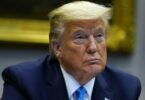WASHINGTON (thehill): President Biden’s new, more aggressive approach to pressure reluctant or unwilling people to get vaccinated is a risky political play for a president who put defeating the coronavirus at the center of his agenda — though it could also come with a big payoff.
It’s a decision the White House appeared reluctant to make for months, and it opens Biden up to fresh attacks from Republicans angling to paint the White House as overreaching and putting the government at too central a position in people’s lives.
Some federal worker unions have already voiced opposition and it may face legal challenges, though experts and the Justice Department say Biden and other businesses that choose to mandate vaccines are on solid legal ground.
Democrats say Biden didn’t really have a choice but to do more to pressure unvaccinated people to get vaccinated.
Facing rising cases, deaths and hospitalizations, Biden did not want to see the country slide into a perilous situation that could also hamper an economic recovery. All of this would challenge Democrats in next year’s midterm elections and cut into Biden’s core argument for running for president — that he could spearhead a recovery from the pandemic.
“I think they were facing reality,” said William Galston, a senior fellow in the Brookings Institution’s governance studies program and former domestic policy adviser to President Clinton. “The pace of vaccinations has slowed dramatically and at the same time the pace of infections has accelerated dramatically and they’re now facing a situation where they have to double back on some of the relaxations that were announced not that long ago.”
“This, I think, is a blow to national morale and it will also be a blow to the economy if it is not turned around fast,” Galston said. “Clearly, this was not a step the administration wanted to take, but they came around to the decision that they had to take it.”
White House principal deputy press secretary Karine Jean-Pierre said Friday a national COVID-19 vaccine requirement “is not under consideration at this time.”
But Biden’s announcement Thursday that federal workers and contractors would be required to attest that they are vaccinated or submit to regular testing sends a clear message to businesses and states and localities that they, too, should make requirements for COVID-19 vaccines.
It is expected to increase vaccine uptake and could help the U.S. get the virus under control — which would represent a huge victory. That made inching closer to mandates a risk worth taking for Biden.
“Mandates are the political third rail, but they have been proven time and time again to work,” said Larry Gostin, public health law professor at Georgetown University.
A June Kaiser Family Foundation poll found that 51 percent of American adults say employers should require vaccinations, while 46 percent say they should not.
A more recent Morning Consult poll suggests that support for vaccine mandates has grown. Fifty-six percent of respondents said they support employers requiring vaccines for residents, employees or patrons, while 32 percent said they do not.
“I think the people that are vaccinated are getting really, really frustrated with those who aren’t,” said Democratic pollster Celinda Lake, who described the public as supportive of mandates but said it ranges depending on the circumstances and how the question is asked.
Lake also noted that Biden has “a reservoir of confidence and good will” among the public with respect to his handling of the virus.
Implementing the mandate not only gives cover for private employers to do the same, but could also help shift focus from the White House.
“I think that politically and practically the strategy of trying to push this onto employers is really sensible and important. We’re in a particular circumstance in which government pressure either is not going to come because governments are not willing to play their role or it’s going to be resented by the very people you’re trying to reach,” said said Scott Burris, director of the Center for Public Health Law Research at Temple University.
“So spreading out the number of entities for people to resent is probably a good idea.”
Biden’s announcement has garnered a mixed reaction from business groups and unions. The U.S. Chamber of Commerce called the new protocols “prudent steps to protect public health and our economic recovery.”
AFL-CIO President Richard Trumka told C-SPAN this week a mandate like the one Biden is implementing is an “acceptable” way to increase vaccinations and safety in the workplace.
But the pro-union administration is also facing pushback from some major employee bargaining units.
The International Association of Fire Fighters, which endorsed Biden ahead of the 2020 election, said it encourages members to get vaccinated, but does not support mandates.
The American Postal Workers Union said in a statement that “it is not the role of the federal government to mandate vaccinations for the employees we represent,” while the Federal Law Enforcement Officers Association said, “Forcing people to undertake a medical procedure is not the American way and is a clear civil rights violation no matter how proponents may seek to justify it.”
Some Republican elected leaders have also been outspoken about their opposition to vaccine mandates. Rep. James Comert (Ky.), the top Republican on the House Oversight Committee, called it a “pandemic power grab” that would put the country on the path to “vaccine passports.”
Broadly, Biden already faces tremendous difficulty in adapting his public health message to reach Republican voters.
“There’s a whole swath of the country that, on anything, tunes out the president from another party,” said Doug Heye, a former communications director for the Republican National Committee. “Regardless of what Biden says, the whole messaging around COVID has been politicized.”
Some of the vaccine requirements imposed at the local level have also drawn pushback. The unions representing paramedics and firefighters in New York City raised concerns with Mayor Bill de Blasio’s (D) directive for city workers to get the shot or face frequent testing, and a union representing California state employees is also reportedly prepared to fight a similar mandate from Gov. Gavin Newsom (D).
One former Trump administration health official argued some type of mandate or attestation system like the one announced by Biden on Thursday is needed at this point in the pandemic and suggested “it should have been done before.”
“I think Biden should lean into it. The polling is pretty clear that a majority of Americans support mandates on vaccines and Republicans are catering to a vocal minority and not the majority of the American people,” said Democratic strategist Josh Schwerin.
Gostin surmised that the resistance to mandates would likely dissipate, pointing to the situation in France, where vaccine mandates for restaurants, trains and other settings spurred protests but also caused a rush in appointments for vaccines.
“I think there will be backlash but I think the opposition and the resistance will melt away … fairly soon,” said Gostin.
Meanwhile, the Biden administration is facing a ticking clock as it tries to get more people to abide by new public health guidance on masks and get more people vaccinated. Along with the federal vaccine requirement, Biden announced new vaccine incentive initiatives, like $100 payments to newly vaccinated Americans.
For Burris, the worsening COVID-19 situation across the U.S. reminds him of a scene from “Monty Python and the Holy Grail.”
“God knows reality is fighting us and we’re acting like the Black Knight in Monty Python in some places,” he said. “But there is going to be a time where there are no limbs left to cut off.”






